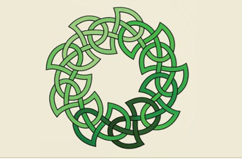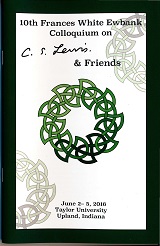Event Title
Paper Session 4-C: Philosophical and Theological Themes
Location
Euler 118
Start Date
3-6-2016 3:30 PM
Description
"What Use Is the Argument From Reason? An Enquiry Into the Metaphysical, Epistemological, & Practical Implications of C. S. Lewis's Fascinating Argument" - Louis J. Swingrover
Just what positions or actions the argument from reason justifies one to adopt or perform remains hotly disputed. In this paper I introduce the argument, raising critical concerns, using the second edition of Lewis's Miracles and Victor Reppert's development of it in C. S. Lewis's Dangerous Idea. I then sketch out two strategies by which naturalists might be able to defend their position. In the first strategy naturalism is assumed for the sake of argument and a dilemma is posed for proponents of the argument from reason. In the second strategy proponents are accused of committing the genetic fallacy. I consider whether Lewis's argument might dodge this accusation if it is read as a 'de jure' challenge to naturalism. I then draw on Plantinga's early account of warrant and put his rebuttal to Freud and Marx in Warranted Christian Belief to work against Lewis. After these two strategies are introduced I conclude that while the argument from reason does not defeat naturalism, it calls attention to the deep rift between natural and supernatural worldviews and reveals the profound supernatural assumptions that underlie much of Western thought.
"Extending Lewis's typology of friendship" - Bo Helmich
One of the most intriguing and memorable elements of C. S. Lewis's account of friendship is his distinction between our "first" and "second" friends. To Lewis's way of thinking, the first friend is a kindred soul--that person with whom you share an otherwise unappreciated fascination for Norse mythology, container gardening, or Russian naval history. The second friend, by contrast, is our ideal sparring partner. This person's thinking resembles and achoes our own, but with a maddening difference: he or she has read all of the same books, but drawn very different lessons from them. Lewis credits his own intellectual and personal development, and much of his happiness in life, to the lasting influence of both types of friends.
One notable limitation of Lewis's scheme is that it seems inadequate to account for the bond of friendship obtaining between the believer and Jesus Christ. In The Four Loves, for example, Lewis adopts a highly ambivalent stance regarding the value of friendship in relation to faith. The aim of this paper is to extend and improve upon Lewis's typology of friendship. Specifically, I argue that Jesus may be justly regarded as the archetypal "third friend." The starting point for this claim will naturally be the gospel of John ("No longer do I call you servants...but I have called you friends"), but I propose looking also to other sources in the broader Christian tradition (Aelred of Rievaulx, Gerard Manley Hopkins, and Lewis himself) as a way of understanding what friendship with Christ entails.
"Answers for Orual: C. S. Lewis as Defensor Fidei" - Donald T. Williams
Many have argued about the validity of C. S. Lewis's arguments. This paper will look at him as a practical role model for Christian apologists. He understood the evangelistic situation we face in the modern world; he understood how to communicate abstruse ideas and linear arguments in a way that normal human beings can follow; he understood that good arguments are a necessary but not a sufficient condition of an effective apologia; he knew how to make his arguments meaningful by calling Imagination to the aid of Reason and by putting them in the context of a life of loving service. The conclusion is "Go thou and do likewise."
Event Type
Paper
Paper Session 4-C: Philosophical and Theological Themes
Euler 118
"What Use Is the Argument From Reason? An Enquiry Into the Metaphysical, Epistemological, & Practical Implications of C. S. Lewis's Fascinating Argument" - Louis J. Swingrover
Just what positions or actions the argument from reason justifies one to adopt or perform remains hotly disputed. In this paper I introduce the argument, raising critical concerns, using the second edition of Lewis's Miracles and Victor Reppert's development of it in C. S. Lewis's Dangerous Idea. I then sketch out two strategies by which naturalists might be able to defend their position. In the first strategy naturalism is assumed for the sake of argument and a dilemma is posed for proponents of the argument from reason. In the second strategy proponents are accused of committing the genetic fallacy. I consider whether Lewis's argument might dodge this accusation if it is read as a 'de jure' challenge to naturalism. I then draw on Plantinga's early account of warrant and put his rebuttal to Freud and Marx in Warranted Christian Belief to work against Lewis. After these two strategies are introduced I conclude that while the argument from reason does not defeat naturalism, it calls attention to the deep rift between natural and supernatural worldviews and reveals the profound supernatural assumptions that underlie much of Western thought.
"Extending Lewis's typology of friendship" - Bo Helmich
One of the most intriguing and memorable elements of C. S. Lewis's account of friendship is his distinction between our "first" and "second" friends. To Lewis's way of thinking, the first friend is a kindred soul--that person with whom you share an otherwise unappreciated fascination for Norse mythology, container gardening, or Russian naval history. The second friend, by contrast, is our ideal sparring partner. This person's thinking resembles and achoes our own, but with a maddening difference: he or she has read all of the same books, but drawn very different lessons from them. Lewis credits his own intellectual and personal development, and much of his happiness in life, to the lasting influence of both types of friends.
One notable limitation of Lewis's scheme is that it seems inadequate to account for the bond of friendship obtaining between the believer and Jesus Christ. In The Four Loves, for example, Lewis adopts a highly ambivalent stance regarding the value of friendship in relation to faith. The aim of this paper is to extend and improve upon Lewis's typology of friendship. Specifically, I argue that Jesus may be justly regarded as the archetypal "third friend." The starting point for this claim will naturally be the gospel of John ("No longer do I call you servants...but I have called you friends"), but I propose looking also to other sources in the broader Christian tradition (Aelred of Rievaulx, Gerard Manley Hopkins, and Lewis himself) as a way of understanding what friendship with Christ entails.
"Answers for Orual: C. S. Lewis as Defensor Fidei" - Donald T. Williams
Many have argued about the validity of C. S. Lewis's arguments. This paper will look at him as a practical role model for Christian apologists. He understood the evangelistic situation we face in the modern world; he understood how to communicate abstruse ideas and linear arguments in a way that normal human beings can follow; he understood that good arguments are a necessary but not a sufficient condition of an effective apologia; he knew how to make his arguments meaningful by calling Imagination to the aid of Reason and by putting them in the context of a life of loving service. The conclusion is "Go thou and do likewise."


